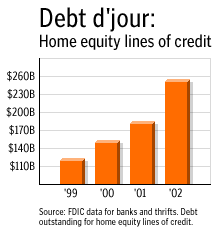New York (CNN/Money) -
For American consumers addicted to spending, the home equity line of credit looks to be the new drug of choice.
As of the end of 2002, homeowners had $351 billion in outstanding debt on home equity loans and lines of credit, according to the Federal Deposit Insurance Corporation, up 19 percent from 2001. The bulk of this debt was in lines of credit, where outstanding loans surged 39 percent last year.
"For some people a home equity line of credit is a brand new shovel for digging themselves further into debt," said Keith Gumbinger, vice president for HSH Associates.
Shovel? Try front-end loader.
The average line of credit available was $55,000 in 2002, according to the Consumer Bankers Association. Homeowners with lines of credit drew down five times for the year, taking out $10,642 each time, on average.
"Lenders are allowing people reasonably unfettered access to their equity," said Gumbinger, noting that banks are increasingly offering lines of credit at the time of closing.

Unlike home equity loans, which pay one lump sum and have a fixed repayment schedule, lines of credit let homeowners tap their equity as they see fit by either writing a check linked to the account or, more recently, a credit card. There is no set repayment schedule, and minimum payments are typically no more than the monthly interest on the loan.
No doubt such lines of credit are convenient, but they also demand a great amount of self control on the part of the homeowner.
Good debt verses bad deb
"There are times when it's very appropriate to borrow against your home equity," said Fritz Elmendorf of the Consumer Bankers Association. Borrowing to make home improvements or even pay education costs are cases where it is appropriate to use home equity, he said, because you're putting money into an asset.
If must borrow money, this is among the cheapest ways to do so right now. Rates for home equity lines of credit, which are almost always variable, were recently 4.9 percent, according to HSH Associates. Rates for home equity loans, which are typically fixed, were recently 7.3 percent.
To add to the bargain, homeowners can in most cases deduct any interest they pay for these loans or lines of credit, regardless of how they use the money. (If you're subject to the alternative minimum tax you can only deduct interest related to the home.)
For these reason, it might make sense to use your home equity to consolidate debt. "That's as long as it doesn't become an excuse to charge up your credit cards and put yourself back where you were," said Elmendorf.
Unfortunately, two-thirds of people who use home equity to consolidate debt do exactly that, according to Chris Viale, general manager of Cambridge Credit Counseling Corp., a nonprofit debt management firm. "Within two years these people have the same amount of unsecured debt they had before they consolidated," he said. That's on top of the money they borrowed from their home equity.
"The problem is that it's too easy a fix," said Viale. "Consumers lower their monthly payments, so then they feel good about themselves and go spend some more."
What's the worst that could happen?
Right now may be the best of all times to borrow from equity. Rates are low and home prices are high. But that, say experts, is exactly why homeowners should borrow with care. "Leveraging yourself out at a time when prices are very high certainly could set you up for difficult times," said Gumbinger.
Indeed, if the market value of your house declines, you could end up owing more on your house than it is worth. In some severe cases, homeowners have been forced into foreclosure because they could not make the minimum payments due on their home equity.
Even if you don't suck out all of the equity in your house, you could be stuck paying a higher interest rate than you initially bargained for. Remember, rates on lines of credit are typically variable.
Self control may not be enough
How do you avoid treating your home equity like money in the bank? Just as diet experts recommend keeping fatty foods out of the refrigerator, credit experts recommend keeping home equity out of hands reach.
"Don't take any credit you don't need," said Viale. That is, when your bank extends you the line of credit, say no thank you. You can always get a line of credit when you need one, added Gumbinger, and you'll probably get a better rate by shopping around on the open market rather than taking what's offered by your lender.
What's more, you don't need to accept the full amount given to you. Although most banks typically limit home equity loans to 80 percent of equity, according to Elmendorf, some do allow homeowners to borrow against 100 percent of their equity and in some cases amounts above their equity. "If you don't trust yourself with that much credit, you should ask that the limit be reduced," he said.
Once you do get a line of credit, remind yourself that it is a loan and should only be called upon in emergencies or for worthy purposes.
Then consider declining any credit card attached to the account and keep the corresponding checkbook in a safety deposit box or other spot that will force you to think before you borrow.

|

